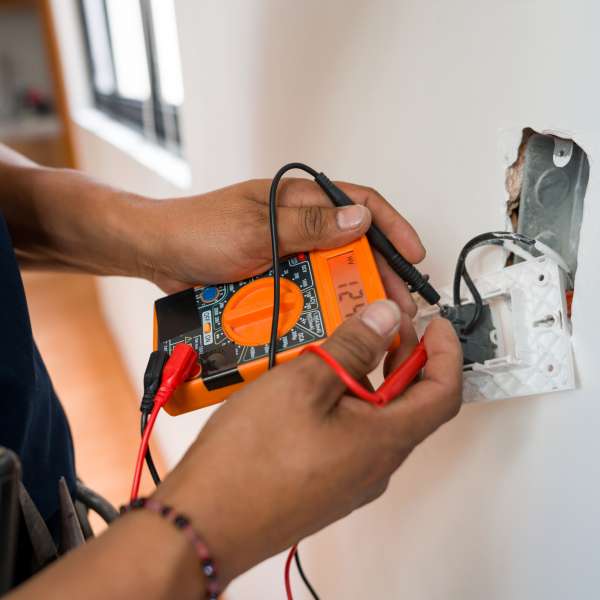
Do you like working with your hands and helping others? An experienced electrician is a valuable person for busy homeowners, commercial landlords, and business owners to have in their contacts list. Your services could help them keep their electrical systems safe and in working order.
You will need to complete an approved training program and, in many cases, become licensed to work as an electrician. Once you have mastered the basics of working with electrical systems (or choose a specialty to focus on), you may be ready to start your own small business.
If you’re considering whether to become an electrician, keep reading to learn more about:
- What an electrician does
- The job outlook for electricians
- Electrician training and apprenticeships
- Electrician qualifications (licensing)
- Electrician insurance options
What does an electrician do?
An electrician installs, repairs, and maintains electrical systems in residential and commercial buildings. Electricians typically need to know how to:
- Read blueprints, technical drawings, and diagrams
- Following building codes and regulations
- Inspect electrical components
- Install lighting, control, and wiring systems
- Repair or replace wiring
- Identify problems through testing
An electrician may inspect the circuit breakers, replace a lighting fixture, or install an alarm system. They may replace faulty wiring in an older home or install a completely new system to bring a building up to code. A master electrician may train an apprentice in this work or manage a staff of less experienced electricians.
Job Outlook for Electricians
Data from the Bureau of Labor Statistics (BLS) shows a positive outlook for American electricians. There were nearly 730,000 electrician jobs in 2020, with another 66,100 expected to be created by 2030. This is a projected growth of 9%, slightly faster than the average for all professions.
Salary is one reason why many people decide to start an electrician career. The average salary across the entire country is $63,310 as of May 2021. However, electricians working in certain areas and industries have the potential to earn much more. New York ($81,700) and California ($75,870) have the highest average salaries for electricians, and those working in natural gas distribution are also well paid ($104,920).
Where to Find Electrician Training?
To become an electrician, you will need to complete an approved apprenticeship. A high school diploma is all the education necessary to begin an electrical apprenticeship; however, some people do attend a technical school first. Completing courses through a technical school can provide you with basic instruction, and you may receive credit for your apprenticeship.
During your apprenticeship, you will receive paid hands-on training under the supervision of a qualified electrician. It typically takes four to five years to complete a full-time electrical apprenticeship. Apprenticeships can be found through trade schools, unions, and non-union industry organizations.
In some states, electrician requirements may mean that you must register as an electrical apprentice before you can work on job sites. It’s important to check the laws in your area to ensure you are legally able to work throughout your apprenticeship.
Do I need a license to become an electrician?*
Most states will require you to have a statewide license to work as an electrician, but some leave licensing to counties or other local jurisdictions. Licensed electrician requirements vary between states, but generally, you will need to:
- Be at least 18 years old
- Complete an approved apprenticeship or training program
- Meet work experience minimums
- Pass an electrician’s exam
There are also different licensing levels in many states. The license you hold may determine the types of projects you can work on, such as residential vs. commercial electricians. As you gain more experience or learn new skills, you can move up from a journeyman to a master electrician.
Starting an Electrical Business
Once you’ve received your electrician qualification and gotten licensed, you might decide to start your own business. Being your own boss comes with benefits, such as:
- Choosing your working hours and the services you provide
- Setting your hourly rate
- Picking your clients and projects
- Seeing your work help others
While many residential electricians offer a range of home repair services to homeowners, you might choose a niche to set yourself apart. If you plan to specialize your offering, it may be wise to choose something you are experienced in that is highly profitable for your business. For example, installing ceiling fans and light fixtures could be an in-demand job in your area that you could jump on.
To start your own electrical business, you may need to:
- Research the need for electricians in your local area
- Study your competition, including their advertising strategy and pricing
- Choose a name and logo for your business
- Get a business license and register your business name (if necessary)
- Set up separate business accounts and get an employer identification number (EIN) from the IRS
- Apply for project or work permits (if applicable)
- Purchase business insurance
- Build a marketing strategy to advertise your business and services
For more information on starting a small business, our guide to starting an electrical business might help.
Electrician Insurance** for Your Business
Once you start your small electrical business, you may want to protect it. Business insurance is one way that professional electricians shield their finances from common risks. The electrician requirements in your state may mandate some coverage to become licensed or to get a business license.
Electricians may consider many types of business insurance. Common policies that an electrician may think about include:
- General Liability – Property damage and bodily injury claims from outside parties are common risks for electricians. Your General Liability policy will cover events like accidentally breaking a customer’s possessions or creating a “slip and fall” incident that causes an injury.
- Business Owners’ Policy – Often abbreviated as BOP, this coverage can be customized to protect you against a range of different risks. An electrician might take up a BOP that combines equipment breakdown and business interruption coverage with General Liability insurance.
- Workers’ Compensation – In most states, you will need this coverage before hiring your first employee to protect against workplace injury and illness claims.
Business insurance can help small business owners manage common risks they may face. Many of these are potentially expensive and can be financially devastating for you and your business. But instead of paying from your own pocket, your insurance policies would cover many of the costs for you. That way, you can invest your money back into your business where it belongs.
Good Luck!
Experienced electricians are an essential part of the construction and maintenance industries. You help build and maintain a vital system found in most buildings. With your help, others can keep their lights on—and their homes and businesses safe!
Protect your growing electrical business with BizInsure. Compare electrician insurance policies online in minutes now!
**As with any insurance, cover will be subject to the terms, conditions and exclusions contained in the policy wording. The information contained on this web page is general only and should not be relied upon as advice.



